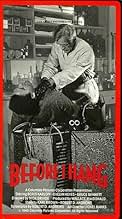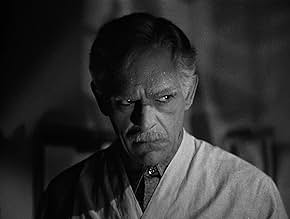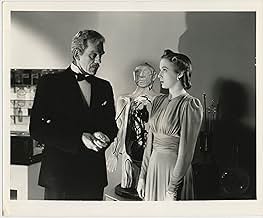अपनी भाषा में प्लॉट जोड़ेंA physician on death row for a mercy killing is allowed to experiment on a serum using a criminals' blood, but secretly tests it on himself. He gets a pardon, but finds out he's become a Jek... सभी पढ़ेंA physician on death row for a mercy killing is allowed to experiment on a serum using a criminals' blood, but secretly tests it on himself. He gets a pardon, but finds out he's become a Jekyll-&-Hyde.A physician on death row for a mercy killing is allowed to experiment on a serum using a criminals' blood, but secretly tests it on himself. He gets a pardon, but finds out he's become a Jekyll-&-Hyde.
- Sam - Hospital Prison Orderly
- (बिना क्रेडिट के)
- Prison Gate Guard
- (बिना क्रेडिट के)
- Governor Prentiss
- (बिना क्रेडिट के)
- Patrolman Olson
- (बिना क्रेडिट के)
- Dr. Nichols
- (बिना क्रेडिट के)
- Mandish
- (बिना क्रेडिट के)
फ़ीचर्ड समीक्षाएं
Though the supporting cast features several familiar faces, they're all somewhat underused: Evelyn Keyes and Bruce Bennett are certainly among the higher-prolife actors to fill the 'romantic interest' roles in this type of film, but they're just about the most thankless I've ever seen (especially Bennett who has barely 5 minutes of screen time)! Edward van Sloan's presence was especially welcome (having memorably faced-off with Karloff twice before) but, again, his prison doctor here is nowhere near as juicy as his iconic roles in Dracula (1931), FRANKENSTEIN (1931), THE MUMMY (1932) and DRACULA'S DAUGHTER (1936)! Pedro de Cordoba, on the other hand, is quite poignant as Karloff's pianist friend whose career is fading due to his advancing age; of course, Boris is willing to help him out in this regard, but his new-found and uncontrollable murderous instincts prevail! A measure of amusement is also gleaned from noticing the recurring presence of such actors as Roger Pryor, Don Beddoe and Charles Trowbridge in roles which were pretty much reprises of ones they had played in the earlier Columbia Karloffs!
On the debit side, the low budget especially shows here in the film's rather dismal sets - the other three of Karloff's serious horror efforts for Columbia made good use of the star's gadget-filled house (THE MAN THEY COULD NOT HANG [1939]), frozen underground lab (THE MAN WITH NINE LIVES [1940]) and Karloff's imposing cliff-top mansion (THE DEVIL COMMANDS [1941]); besides, the rather clinical experiments become repetitive and the film talky, which is further exacerbated by the regrettable fact that throughout there are few action/horror highlights per se.
As far as the film's DVD presentation goes, I found it to be disappointingly lackluster: while the print itself is adequate, there are no scene selections for any of the films in this set (which also proves to be the case with Universal's Karloff collection and the "Inner Sanctum" Set!) nor, for that matter, proper menu screens - have the studios become stingy or what?!
Furthermore, this movie should be be required viewing for modern film-makers, because it really is a masterpiece of succinctness. Not a single frame of film is wasted! The movie only lasts for 62 minutes (although I'm sure the version I saw, early one morning, lasted a good ten minutes less than that!) and yet it crams more plot into that small timescale than a great many drawn-out 3 hour epics! And yet, the real genius of the work is that it does not for a single moment seem *rushed*. Everything flows smoothly right up to the final curtain, and you are left with the feeling of having watched a "full-length" feature--a truly astonishing achievement! I glanced at my watch at about the halfway stage , not out of impatience, but out of sheer wonder at how on earth everything was going to be wrapped up to a neat conclusion within only 25 minutes or so!
This film, more than any other that I can recall, bridges the gap between the frenetic single-reeler comedies of the 20s (which crammed a hell of a lot in, at the expense of a more welcome relaxed pace), and the modern day feature. If there really was five full minutes of piano-playing in this, I can't say that it perturbed me in any way whatsoever--it merely helped to set the melancholy mood of the piece. And that five minutes of a one hour film can be dedicated solely to mood setting, without generating any feeling of slow-down, is something really quite remarkable.
A great genius *can* make a 4 hour film work... but such directors are *extremely* few and far between (e.g. Kurosawa, von Stroheim). All others should learn from the director of this work: the Occam's Razor of feature films.
During this one month period, a breakthrough occurs with Karloff's research. And, in an effort to test the formula, Karloff insists that the other doctor inject him with the formula. The experiment is a success and Karloff now looks and feels much younger and healthier--and as luck has it, the death sentence is commuted, so Karloff can continue working in the prison laboratory. However, slowly the changes that occur in the one-kindly man are unanticipated...and not particularly pleasant to say the least. Why did he change and what happens next? Well, see the film for yourself, as I'd hate to spoil the suspense--though the why is a tad silly.
Overall, a novel idea for a film that is well worth seeing. Karloff fans will have a ball, but non-fans also might enjoy this interesting little B-movie. I particularly liked it because I enjoyed seeing Karloff play such a likable guy--at least until the injection.
क्या आपको पता है
- ट्रिवियाThis film was shot in the house later used in the 1945 title The Picture of Dorian Gray (1945) staring Hurd Hatfield.
- गूफ़When speaking to his older friends, Dr. Garth mentions that humanity had only been able to increase life expectancy by maybe 15 years in the past fifty years of modern science. His friends counter that human lifespan is meant to only be 70 years ("three score and ten"). Both statements are incorrect. Life expectancy in the US was more like 60 (men) and 65 (women) in 1940, up from life expectancy around 40 in 1890. However, data was spotty before 1900, and life expectancy in the early 1900s was closer to 50, which may have been more what Dr Garth was referring to, he was just hyperbolic about the time frame.
- भाव
Dr. John Garth: Someday, somehow, medical science will find a way to end the needless, ghastly suffering caused by the ravages of age!
- कनेक्शनFeatured in TJ and the All Night Theatre: Before I Hang (1979)
टॉप पसंद
विवरण
- रिलीज़ की तारीख़
- कंट्री ऑफ़ ओरिजिन
- भाषा
- इस रूप में भी जाना जाता है
- El mago de la muerte
- उत्पादन कंपनी
- IMDbPro पर और कंपनी क्रेडिट देखें
- चलने की अवधि1 घंटा 2 मिनट
- रंग
- पक्ष अनुपात
- 1.37 : 1
इस पेज में योगदान दें







































